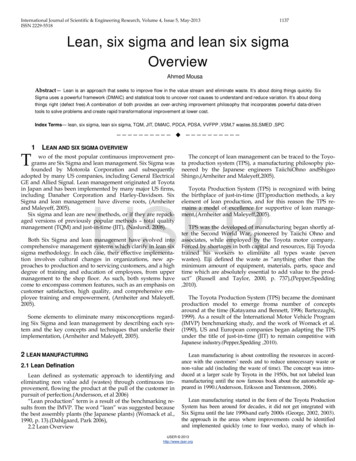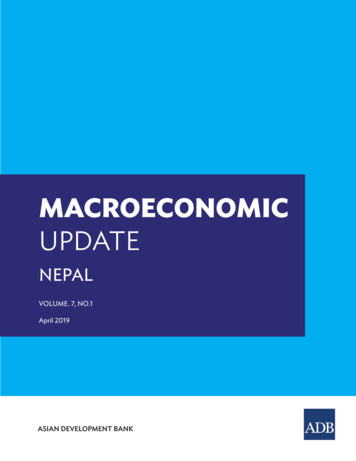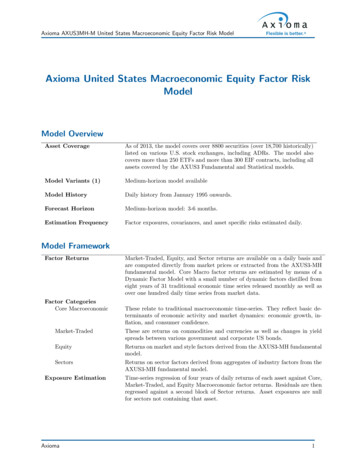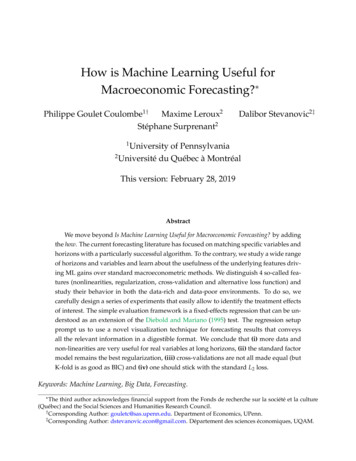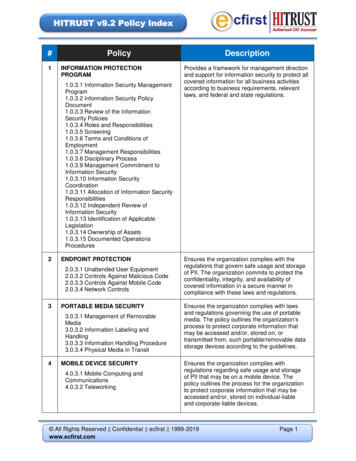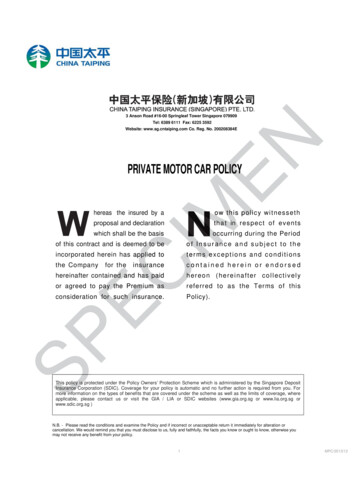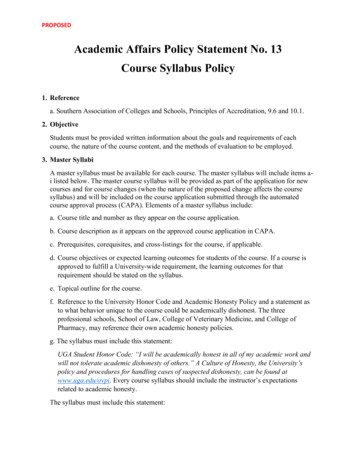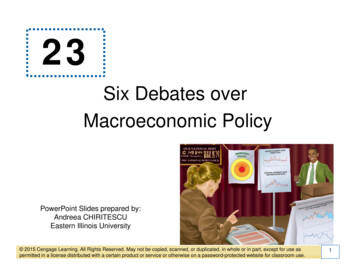
Transcription
23Six Debates overMacroeconomic PolicyPowerPoint Slides prepared by:Andreea CHIRITESCUEastern Illinois University 2015 Cengage Learning. All Rights Reserved. May not be copied, scanned, or duplicated, in whole or in part, except for use aspermitted in a license distributed with a certain product or service or otherwise on a password-protected website for classroom use.1
Debate #11. Should monetary and fiscal policymakerstry to stabilize the economy? Changes in aggregate demand andaggregate supply– Short-run fluctuations in production andemployment Monetary and fiscal policy– Can shift aggregate demand– Influence these fluctuations 2015 Cengage Learning. All Rights Reserved. May not be copied, scanned, or duplicated, in whole or in part, except for use aspermitted in a license distributed with a certain product or service or otherwise on a password-protected website for classroom use.2
Debate #1Pro: policymakers should try to stabilize theeconomy When aggregate demand is too small– High unemployment– Policymakers Boost government spending Cut taxes Expand the money supply 2015 Cengage Learning. All Rights Reserved. May not be copied, scanned, or duplicated, in whole or in part, except for use aspermitted in a license distributed with a certain product or service or otherwise on a password-protected website for classroom use.3
Debate #1Pro: policymakers should try to stabilize theeconomy When aggregate demand is excessive– High inflation– Policymakers Cut government spending Raise taxes Reduce the money supply– More stable economy, benefits everyone 2015 Cengage Learning. All Rights Reserved. May not be copied, scanned, or duplicated, in whole or in part, except for use aspermitted in a license distributed with a certain product or service or otherwise on a password-protected website for classroom use.4
Debate #1Con: policymakers should not try tostabilize the economy Monetary and fiscal policy– Do not affect the economy immediately– Work with a long lag Monetary policy – about 6 months Fiscal policy – long political process, it cantake years– Economic forecasting is highly imprecise 2015 Cengage Learning. All Rights Reserved. May not be copied, scanned, or duplicated, in whole or in part, except for use aspermitted in a license distributed with a certain product or service or otherwise on a password-protected website for classroom use.5
Debate #1Con: policymakers should not try tostabilize the economy Policymakers trying to stabilize theeconomy– Can do just the opposite– Economic conditions can easily change 2015 Cengage Learning. All Rights Reserved. May not be copied, scanned, or duplicated, in whole or in part, except for use aspermitted in a license distributed with a certain product or service or otherwise on a password-protected website for classroom use.6
Debate #1 2015 Cengage Learning. All Rights Reserved. May not be copied, scanned, or duplicated, in whole or in part, except for use aspermitted in a license distributed with a certain product or service or otherwise on a password-protected website for classroom use.7
Debate #22. Should the government fight recessionswith spending hikes rather than tax cuts? President George W. Bush, 2001– Economy was slipping into a recession– Cutting tax rates President Barack Obama, 2009– Economy –worst recession in many decades– Stimulus package – tax reductions andsubstantial increases in government spending 2015 Cengage Learning. All Rights Reserved. May not be copied, scanned, or duplicated, in whole or in part, except for use aspermitted in a license distributed with a certain product or service or otherwise on a password-protected website for classroom use.8
Debate #2Pro: the government should fight recessionswith spending hikes Fundamental problem during recessions– Inadequate aggregate demand Key to ending recessions– Restore aggregate demand to a levelconsistent with full employment 2015 Cengage Learning. All Rights Reserved. May not be copied, scanned, or duplicated, in whole or in part, except for use aspermitted in a license distributed with a certain product or service or otherwise on a password-protected website for classroom use.9
Debate #2Pro: the government should fight recessionswith spending hikes Monetary policy– First line of defense - economic downturns– Increasing the money supply Reduces interest rates Reduce the cost of borrowing Increased spending on investment Increased aggregate demand 2015 Cengage Learning. All Rights Reserved. May not be copied, scanned, or duplicated, in whole or in part, except for use aspermitted in a license distributed with a certain product or service or otherwise on a password-protected website for classroom use.10
Debate #2Pro: the government should fight recessionswith spending hikes Fiscal policy– Cutting taxes Increased household disposable income Increase spending on consumption– Increased government spending Adds directly to aggregate demand 2015 Cengage Learning. All Rights Reserved. May not be copied, scanned, or duplicated, in whole or in part, except for use aspermitted in a license distributed with a certain product or service or otherwise on a password-protected website for classroom use.11
Debate #2Pro: the government should fight recessionswith spending hikes Fiscal policy– Multiplier effects Higher aggregate demand - Higher incomes Induces additional consumer spending Further increases in aggregate demand– Particularly useful when the tools ofmonetary policy lose their effectiveness 2015 Cengage Learning. All Rights Reserved. May not be copied, scanned, or duplicated, in whole or in part, except for use aspermitted in a license distributed with a certain product or service or otherwise on a password-protected website for classroom use.12
Debate #2Pro: the government should fight recessionswith spending hikes Economic downturn of 2008 and 2009– The Fed cut its target interest rate toalmost zero Cannot reduce interest rates below zero Once interest rates are at zero, the Fed haslost its most powerful tool– Turn to fiscal policy 2015 Cengage Learning. All Rights Reserved. May not be copied, scanned, or duplicated, in whole or in part, except for use aspermitted in a license distributed with a certain product or service or otherwise on a password-protected website for classroom use.13
Debate #2Pro: the government should fight recessionswith spending hikes Traditional Keynesian analysis– Increases in government purchases are amore potent tool than decreases in taxes 1 tax cut – part of it may be saved– Only part adds to AD 1 government spending – fully adds to AD 2015 Cengage Learning. All Rights Reserved. May not be copied, scanned, or duplicated, in whole or in part, except for use aspermitted in a license distributed with a certain product or service or otherwise on a password-protected website for classroom use.14
Debate #2Pro: the government should fight recessionswith spending hikes 2009, Obama administration estimations– 1of tax cuts increases GDP by 0.99– 1of government purchases increasesGDP by 1.59– The 800 billion stimulus package Create or save more than 3 million jobs by theend of the president’s second year in office 2015 Cengage Learning. All Rights Reserved. May not be copied, scanned, or duplicated, in whole or in part, except for use aspermitted in a license distributed with a certain product or service or otherwise on a password-protected website for classroom use.15
Debate #2Pro: the government should fightrecessions with spending hikes 3 kinds of government spending– “Shovel-ready” projectsPresident Barack Obama– Federal aid to state and local delivers remarks at thegroundbreaking of a roadgovernmentsproject funded by theRecovery and Constitutionally required to run AmericanReinvestment Act, Friday,balanced budgetsJune 18, 2010, inColumbus, Ohio.– Increased payments to the jobless- unemployment insurance system 2015 Cengage Learning. All Rights Reserved. May not be copied, scanned, or duplicated, in whole or in part, except for use aspermitted in a license distributed with a certain product or service or otherwise on a password-protected website for classroom use.16
Debate #2Con: the government should fight recessionswith tax cuts Tax cuts– Increase AD Increase households’ disposable income By altering incentives - stimulate investment– Increase AS Unemployed - incentive to search for jobs Employed - incentive to work longer hours 2015 Cengage Learning. All Rights Reserved. May not be copied, scanned, or duplicated, in whole or in part, except for use aspermitted in a license distributed with a certain product or service or otherwise on a password-protected website for classroom use.17
Debate #2Con: the government should fight recessionswith tax cuts Problems with increasing governmentspending during recessions– Government-spending multipliers – smaller Consumers - higher taxes in the future– Cut back spending today Firms - reduced expectations of future profits– Reduce investment spending today 2015 Cengage Learning. All Rights Reserved. May not be copied, scanned, or duplicated, in whole or in part, except for use aspermitted in a license distributed with a certain product or service or otherwise on a password-protected website for classroom use.18
Debate #2Con: the government should fight recessionswith tax cuts Problems with increasing governmentspending during recessions– Fast increase in spending Buy things of little public value– “Bridges to nowhere”– Careful and deliberate planning Long lags 2015 Cengage Learning. All Rights Reserved. May not be copied, scanned, or duplicated, in whole or in part, except for use aspermitted in a license distributed with a certain product or service or otherwise on a password-protected website for classroom use.19
Debate #33. Should monetary policy be made by rulerather than by discretion? Federal Open Market Committee– Sets monetary policy – complete discretion– Meets about every six weeks Evaluate the state of the economy– Short-term interest rates Raise, lower, or leave unchanged– The Fed - adjusts the money supply 2015 Cengage Learning. All Rights Reserved. May not be copied, scanned, or duplicated, in whole or in part, except for use aspermitted in a license distributed with a certain product or service or otherwise on a password-protected website for classroom use.20
Debate #3Pro: monetary policy should be made by rule Problems with discretionary monetarypolicy– Does not limit incompetence and abuse ofpower Political business cycle– If central bankers ally with politicians– Discretionary policy - can lead to economicfluctuations that reflect the electoral calendar 2015 Cengage Learning. All Rights Reserved. May not be copied, scanned, or duplicated, in whole or in part, except for use aspermitted in a license distributed with a certain product or service or otherwise on a password-protected website for classroom use.21
Debate #3Pro: monetary policy should be made by rule Problems with discretionary monetarypolicy– It might lead to more inflation than isdesirable Time inconsistency of policy– Central bankers – know there is no long-run tradeoff between inflation and unemployment» Announce goal - zero inflation» Short-run trade-off between inflation andunemployment 2015 Cengage Learning. All Rights Reserved. May not be copied, scanned, or duplicated, in whole or in part, except for use aspermitted in a license distributed with a certain product or service or otherwise on a password-protected website for classroom use.22
Debate #3Con: monetary policy should not be madeby rule Discretionary monetary policy – flexible– The Fed – various circumstances– Better to appoint good people to conductmonetary policy And then give them the freedom to do the bestthey can– The alleged problems with discretion Are largely hypothetical 2015 Cengage Learning. All Rights Reserved. May not be copied, scanned, or duplicated, in whole or in part, except for use aspermitted in a license distributed with a certain product or service or otherwise on a password-protected website for classroom use.23
Debate #44. Should the central bank aim for zeroinflation? Inflation– Prices rise when the government printstoo much money– Society faces a short-run trade-offbetween inflation and unemployment 2015 Cengage Learning. All Rights Reserved. May not be copied, scanned, or duplicated, in whole or in part, except for use aspermitted in a license distributed with a certain product or service or otherwise on a password-protected website for classroom use.24
Debate #4Pro: the central bank should aim for zeroinflation Six costs of inflation:– Shoeleather costs associated withreduced money holdings– Menu costs associated with more frequentadjustment of prices– Increased variability of relative prices 2015 Cengage Learning. All Rights Reserved. May not be copied, scanned, or duplicated, in whole or in part, except for use aspermitted in a license distributed with a certain product or service or otherwise on a password-protected website for classroom use.25
Debate #4Pro: the central bank should aim for zeroinflation Six costs of inflation:– Unintended changes in tax liabilities dueto non-indexation of the tax code– Confusion and inconvenience resultingfrom a changing unit of account– Arbitrary redistributions of wealthassociated with dollar-denominated debts 2015 Cengage Learning. All Rights Reserved. May not be copied, scanned, or duplicated, in whole or in part, except for use aspermitted in a license distributed with a certain product or service or otherwise on a password-protected website for classroom use.26
Debate #4Pro: the central bank should aim for zeroinflation Reducing inflation– Temporary: high unemployment & lowoutput– Long-run: no trade-off– Temporary costs– Permanent benefits 2015 Cengage Learning. All Rights Reserved. May not be copied, scanned, or duplicated, in whole or in part, except for use aspermitted in a license distributed with a certain product or service or otherwise on a password-protected website for classroom use.27
Debate #4 Con: the central bank should not aim forzero inflation Benefits of zero inflation – are small– Compared to moderate inflation Costs of reaching zero inflation are large– Sacrifice ratio– Social costs Small inflation - may be a good thing 2015 Cengage Learning. All Rights Reserved. May not be copied, scanned, or duplicated, in whole or in part, except for use aspermitted in a license distributed with a certain product or service or otherwise on a password-protected website for classroom use.28
Debate #55. Should the government balance itsbudget? When the government spends more thanit collects in tax revenue– It covers this budget deficit by issuinggovernment debt Affect saving, investment, and interest rates 2015 Cengage Learning. All Rights Reserved. May not be copied, scanned, or duplicated, in whole or in part, except for use aspermitted in a license distributed with a certain product or service or otherwise on a password-protected website for classroom use.29
Debate #5Pro: government should balance its budget Federal debt– 712 billion in 1980– 11.3 trillion in 2012– 36,000 - each person’s share of thegovernment debt“What?!? My share ofthe government debtis 36,000?” 2015 Cengage Learning. All Rights Reserved. May not be copied, scanned, or duplicated, in whole or in part, except for use aspermitted in a license distributed with a certain product or service or otherwise on a password-protected website for classroom use.30
Debate #5Pro: government should balance its budget Government debt– Direct effect: place a burden on futuregenerations– Macroeconomic effects Lower national saving Future generations: lower incomes and highertaxes 2015 Cengage Learning. All Rights Reserved. May not be copied, scanned, or duplicated, in whole or in part, except for use aspermitted in a license distributed with a certain product or service or otherwise on a password-protected website for classroom use.31
Debate #5Pro: government should balance its budget Justifiable to run a budget deficit– War– Temporary downturn in economic activity Not all budget deficits can be justified bywar or recession 2015 Cengage Learning. All Rights Reserved. May not be copied, scanned, or duplicated, in whole or in part, except for use aspermitted in a license distributed with a certain product or service or otherwise on a password-protected website for classroom use.32
Debate #5Pro: government should balance its budget 1980 – 1995, government debt aspercentage of GDP– Increased from 26 to 50% of GDP No major military conflict No major economic downturn– Causes Easier to increase government spending Than to increase taxes 2015 Cengage Learning. All Rights Reserved. May not be copied, scanned, or duplicated, in whole or in part, except for use aspermitted in a license distributed with a certain product or service or otherwise on a password-protected website for classroom use.33
Debate #5Pro: government should balance its budget Budget deficit in recent years– Wars in Iraq and Afghanistan– Effects of the recessions in 2001 and2008–2009– Imperative that this deficit not signal areturn to the unsustainable fiscal policy ofan earlier era 2015 Cengage Learning. All Rights Reserved. May not be copied, scanned, or duplicated, in whole or in part, except for use aspermitted in a license distributed with a certain product or service or otherwise on a password-protected website for classroom use.34
Debate #5Pro: government should balance its budget Aim for a balanced budget– Greater national saving– Greater investment– Economic growth 2015 Cengage Learning. All Rights Reserved. May not be copied, scanned, or duplicated, in whole or in part, except for use aspermitted in a license distributed with a certain product or service or otherwise on a password-protected website for classroom use.35
Debate #5Con: government should not balance itsbudget The problem of government debt– Often exaggerated– Government debt - tax burden on youngergenerations Not large compared to lifetime income Lifetime income 2 million Debt 36,000 per person– 2% of lifetime income 2015 Cengage Learning. All Rights Reserved. May not be copied, scanned, or duplicated, in whole or in part, except for use aspermitted in a license distributed with a certain product or service or otherwise on a password-protected website for classroom use.36
Debate #5Con: government should not balance itsbudget Budget deficit– Just one piece of a large picture Of how the government chooses to raise andspend money Fiscal policy– Affect different generations of taxpayers 2015 Cengage Learning. All Rights Reserved. May not be copied, scanned, or duplicated, in whole or in part, except for use aspermitted in a license distributed with a certain product or service or otherwise on a password-protected website for classroom use.37
Debate #5Con: government should not balance itsbudget Government debt - can continue to riseforever– Burden of the government debt relative tothe size of the nation’s income– Economy – grows over time– Nation’s ability to pay the interest on thegovernment debt grows over time as well 2015 Cengage Learning. All Rights Reserved. May not be copied, scanned, or duplicated, in whole or in part, except for use aspermitted in a license distributed with a certain product or service or otherwise on a password-protected website for classroom use.38
Debate #5Con: government should not balance itsbudget Government debt - can continue to riseforever– As long as the government debt growsmore slowly than the nation’s income There is nothing to prevent the governmentdebt from growing forever– Real o
Debate #1 Pro: policymakers should try to stabilize the economy When aggregate demand is excessive –High inflation –Policymakers Cut government spending Raise taxes Reduce

